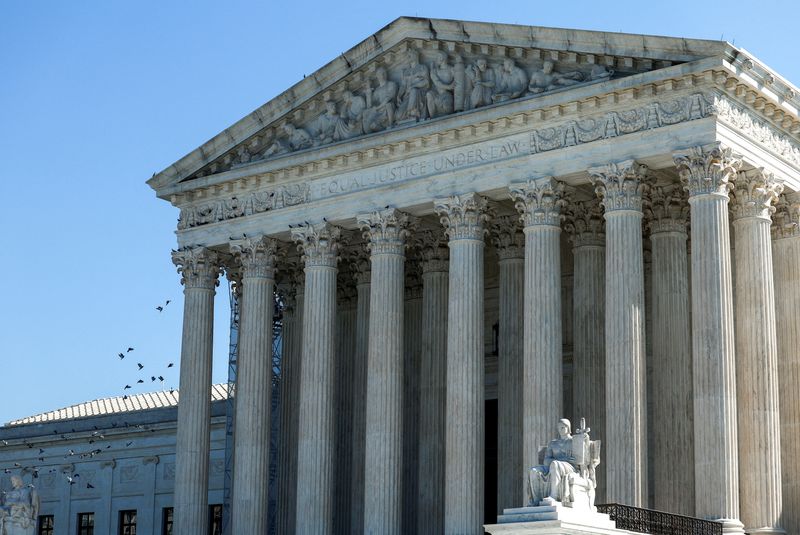By Andrew Chung and John Kruzel
WASHINGTON (Reuters) - The U.S. Supreme Court's conservative justices on Wednesday appeared sympathetic to a bid by three Republican-led states and several energy companies to block an Environmental Protection Agency regulation aimed at reducing ozone emissions that may worsen air pollution in neighboring states.
Ohio, Indiana and West Virginia, as well as pipeline operators including Kinder Morgan (NYSE:KMI), power producers and U.S. Steel Corp, are seeking to avoid complying with the EPA's "Good Neighbor" plan restricting ozone pollution from upwind states, while they contest its legality in a lower court.
During arguments in the case on Wednesday, some justices expressed concern about whether the Supreme Court intervention was warranted at this time.
The questions posed by some of the conservative justices focused on whether the EPA's rule should be enforceable against the challengers given that the regulation no longer regulates 23 upwind states as intended, but only 11 because of lower court actions pausing it in 12 states. The Supreme Court has a 6-3 conservative majority.
"The problem is we're not sure if the requirements would be the same with 11 states as with 23, and it's just not explained," conservative Justice Brett Kavanaugh told Malcolm Stewart, a Justice Department lawyer defending the EPA.
Conservative Chief Justice John Roberts expressed concern that the EPA has not explained how the regulation is viable for 11 states when it was devised for 23, given the huge costs that industry players have said they will incur to comply.
"In terms of why it's necessary to look at this here ... it's because EPA will not look at it until after the hundreds of millions of dollars of costs are incurred," Roberts told Stewart.
The Supreme Court did not immediately act on emergency requests filed in October by the challengers to halt enforcement, opting instead to hear arguments first, including on whether the EPA rule's emissions controls are reasonable.
The challenge comes after a major 2022 ruling powered by the court's conservative majority imposing limits on the EPA's authority to issue sweeping regulations to reduce carbon emissions from coal- and gas-fired power plants under the Clean Air Act anti-pollution law.
At issue in the current dispute is an EPA rule, finalized last June by Democratic President Joe Biden's administration, regulating ozone, a key component of smog, in 23 upwind states. The EPA said these states' own plans did not satisfy the "Good Neighbor" provision of the Clean Air Act requiring steps to reduce pollution that drifts into states downwind.
The agency implemented a federal program to reduce emissions from large industrial polluters in those states - although separate challenges in lower courts have already paused enforcement in 12 of them, including West Virginia.
The case now before the justices involves litigation brought by Ohio, Indiana and West Virginia - all targeted by the rule - as well as pipeline operators, U.S. Steel, regional electricity generators and energy trade associations. In their suit in the U.S. Court of Appeals for the District of Columbia Circuit, they argued that the EPA violated a federal law aimed at ensuring agency actions are reasonable.
Some of the industry requests were specific. Kinder Morgan asked the justices to block the regulation as it applies to natural gas pipeline engines. U.S. Steel sought to prevent its enforcement against iron and steel mill reheating furnaces and boilers.
Some of the justices raised questions about whether it was the role of the Supreme Court to intervene on behalf of the challengers at this time, when a lower court has yet to resolve the underlying litigation.
"I'm trying to understand what the emergency is that warrants Supreme Court intervention at this point," liberal Justice Ketanji Brown Jackson asked an attorney for Ohio, Mathura Sridharan.
Conservative Justice Amy Coney Barrett pressed Catherine Stetson, a lawyer representing Kinder Morgan and other industry challengers, to spell out the actual, as opposed to projected, costs of compliance.
"Why haven't you talked about that?" Barrett asked. "Have you incurred significant financial costs that are unreasonable?"

The Justice Department, defending the EPA, told the Supreme Court that blocking the rule for these challengers would "seriously harm downwind states that suffer from their upwind neighbors' emissions" and expose their residents to public health risks.
On Jan. 16, the EPA issued a proposed rule to enforce the "Good Neighbor" plan in five more states: Arizona, Iowa, Kansas, New Mexico and Tennessee.